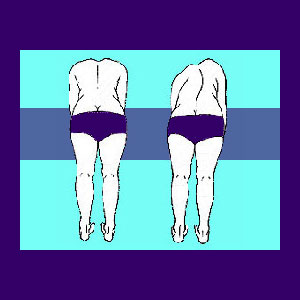
My back went out! This is the war cry of countless millions of chronic and recurrent dorsalgia sufferers who try to live day to day, but suffer regular set backs in the form of back pain flare ups. I know this sad reality all too well, as it described my life from the ages of 16 to 33. I had some good years in my 30s, but now the pain is back to torment me again in my 40s. Once again, I really understand what it is like to suffer these recurrent acute periods of agony.
Many patients are fine much of the time, but then without warning, their back would go out, landing them in desperate pain and confining them to bed for days or weeks. If this has ever happened to you, then I know that you understand exactly how terrifying it can be when severe back ache returns unexpectedly.
My Back Went Out Stories
I get loads of letters and emails from all of you readers with similar stories to my own chronic lumbar back pain nightmare. I am amazed at how many of you use the same terminology to describe these horrific episodes of acute pain. In most cases, nothing actually “goes out”, although it sure feels like it.
Patients under chiropractic care often feel that their vertebrae have subluxated, while those under the care of a physical therapist or physician often feel there is a muscular cause for the pain. I see a particular prevalence of backs going out among long time chiropractic patients, by almost a 3 to 1 ratio over traditional medical care patients. I can not comment on the relevancy of this finding, but thought it was worth mentioning.
When a person’s back goes out, the patient is often bent forward or to one side or the other, by a process known as antalgia, although this is rarely an overly relevant part of the symptomatic expression. In most instances, pain is severe and may be described as burning or shooting, but is usually completely debilitating.
My Back Went Out Solution
In most circumstances, patients rush off to their doctor or chiropractor when their back goes out. Some even go to their local hospital emergency room. This may or may not help resolve the pain and usually time is what is truly needed for the episode to calm down.
Most patients blame the flare-up on some causative activity, such as working too hard, bending over to lift something or twisting at the waist. In certain circumstances, these theories may be correct, but in many others, the implicated act is nothing more than a trigger for idiopathic pain to begin. This is particularly prevalent when there is a mindbody cause or contributor to the painful expression.
Rarely do any patients in such dire circumstances even consider that the pain may be directly related to a conscious or subconscious emotional condition, although this is the truth of the causative matter in many cases. Why else would the back suddenly choose to go acute, particularly when no physical stimulus was actually injurious?
In cases where the patient suffers a delayed onset back pain syndrome, such as after exertion or some traumatic event, the perceived trigger mechanism involved may be innocent and the event blamed for sourcing the pain is usually nothing more than a perfect opportunity to begin symptoms. This is the way psychogenic ischemia works.
Mindbody contributors can occur due to known (conscious) stresses, but are often linked to unknown, repressed (subconscious) stressors.
Who has stress in their lives?
Well, we all do, so it is of paramount importance to recognize how these sensitive emotional scenarios can cause us pain. Always remember to add this consideration to the mix, particularly if you are subject to frequent episodes of unpredictable horrific pain which have not resolved despite active treatment.
My Back Went Out Advice
I do not want any of you to think that there is an exclusive emotional reason to explain every time your back goes out. In some cases, physical factors are causative. However, I want you all to consider the possibility that emotional factors are at least contributory, if not the direct source process. Remember, your emotional state will play a huge role in your overall health and can escalate and perpetuate even purely physically-motivated pain syndromes.
So, the number one question patients ask when their backs do go out is:
What do I do?
This answer is simple. Do whatever works. Get past the acute stage and then get up and around and try to move gently. Never assume you will be relegated to days or weeks of terrible suffering, since this is not often the case. Instead, gingerly try to test your limits and get the body in motion to speed the healing response. Remember to learn all you can about why the pain is supposed to be occurring. Look for holes in the diagnostic theory if your doctor or chiropractor can not cure you.
Become ever more active in your own care and learn everything about your symptoms and diagnosis. Ignorance is not bliss when it comes to back pain and the time when your body is disabled by acute torture may be the ideal opportunity to enhance your understanding of the mental and emotional aspects of chronic pain.





